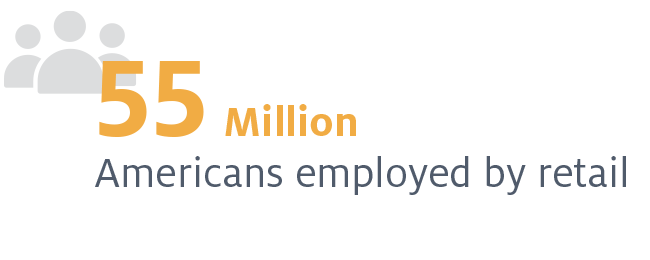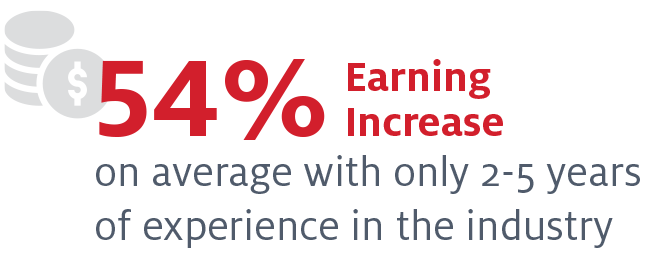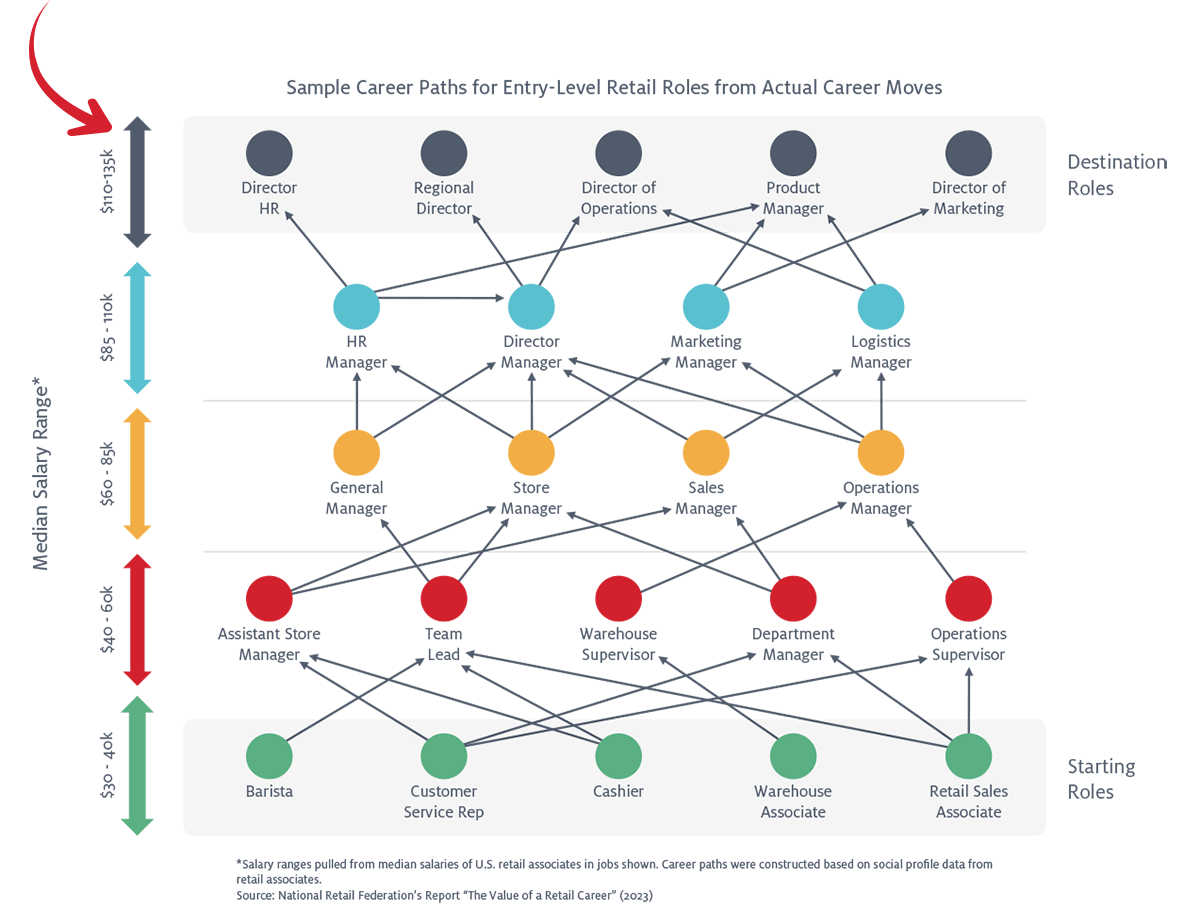Retailing and Consumer Science
The retail industry offers many exciting career paths and the demand for graduates continues to increase. Eight of the top 100 US retail companies are headquartered in the state of Texas. Employers are seeking individuals who can integrate consumer-oriented business practices, technology and retailing. As the demand for graduates continues to increase, so does the salary potential. The average salary for those working in retail management ranging from $53,000–$94,000, with the potential of earning $75,000–$175,000 depending on the type of retailer.
The exciting job opportunities for those in a Bachelor of Science in Retailing and Consumer Science include the following:
Unleash your creativity or your strategic side in retail. Depending upon company size, marketing functions may be centralized in one department, divided into different departments (like advertising, sales promotion, art and visual merchandising, and public/press relations), or group in various combinations. Marketing also conducts focus groups and statistical analysis of customer buying patterns to develop strategies and plans that guide marketing components like ads, websites, store signage, etc.
The intersection of retail art and statistics. These retail professionals select the merchandise to be sold in the stores by sourcing vendors in the U.S. or overseas markets and/or working with vendors to produce house label goods. They facilitate order follow-up, inventory flow through and allocation of merchandise to stores, attending to issues like flow quantities and timing. Statistical development and analysis are increasingly woven into this retail career area, where team members also coordinate gross margin planning/analysis responsibilities, develop distribution plans for merchandise categories and subclasses, and balance stock unit ratios by store..
Involves all of the activities necessary to provide customers with the fashion apparel and accessories they want to buy, when and where they want it, and at prices they can afford and are willing to pay. This involves making plans, understanding the customer, developing or selecting merchandise, and promoting and selling goods to the customer for the ultimate purpose of making a profit. Fashion merchandise includes apparel and accessories for women, men and children, as well as home fashions, cosmetics and fragrances.
Combine practical knowledge with artistic ability to turn abstract ideas into formal designs. They determine the needs of the client, the ultimate function for which the design is intended, and its appeal to customers or users. They often begin by researching the desired design characteristics, such as size, shape, weight, color, materials used, cost, ease of use, fit, and safety. They then prepare sketches or diagrams - by hand or with the aid of a computer - to illustrate the vision for the design. After consulting with the client, a creative director, or a product development team, designers create detailed designs, using drawings, a structural model, computer simulations, or a full-scale prototype.
Typically prefer to be their own boss. Many retail career areas and positions offer lots of opportunities to be entrepreneurial, without the ultimate responsibility of business ownership. But, a large component of retailers own their own store(s). Single, independent, and privately-owned retail businesses account for 95% of the retail industry.
The service side of retail. The sales and sales-related retail career area includes positions like sales associate, cashier, store stock associate, and stock receiver. These frontline positions are retail’s core business--serving the customer and generating sales. The passion for working with all varieties of people, flexibility, level-headedness, problem solving, and teamwork are critical for success in this area. These positions are typically entry points into retail careers, though some choose to spend their professional lives here, particularly in high-end commission-based sales areas like jewelry, appliances, and others. Frontline sales experience is highly valued and many retailers promote from within.
The essence of retail is defined by the ability to compel the prospective customer to stop, to look, and to buy. Today’s customers look beyond simple commodities and basic merchandise, to that which satisfies their wants, needs, and desires. This informed consumer demands selection and quality. To fulfill these expectations, successful visual merchandising coordinators retailers place a great emphasis on compelling life-style presentations of merchandise. The store environment serves as the selling stage for the latest merchandise offerings of the day. Visual merchandising is the passion of retailing.
Assists customers with a level of individualized attention and service beyond what a retail associate would offer. A shopper can help a customer pull together an entire season’s wardrobe based on his or her needs, budget or style, or find just the right gift based on a client’s suggestions. Personal shoppers usually work in upscale department or specialty stores; some work on commission, while others are salaried.
Retail professionals in the store operations career area oversee overall store operations and profits. Sample position titles include Head of Store Operations, Regional Manager, and District Manager, and responsibilities in this area may include managing staff functions like loss prevention and/or human resources.
Involves management- strategy setting, planning, organizing, resourcing, prioritizing, researching, scheduling, renewing, recycling, retiring, enabling, supporting, measuring, improving, collaborating, etc. for products and services, portfolios, and a company’s whole product development program. Johns in product development operations generating, defining, designing, testing, validating, prototyping, modeling, building, developing, provisioning, sourcing, maintaining, changing.
Public relations managers direct publicity programs to an audience upon which their organization’s success depends, such as consumers, stockholders or the general public. They often specialize in a specific area, like crisis management, or a specific industry, such as healthcare. They use all available communication media in their efforts to maintain their target group’s support.
The best way to define a manufacturer’s rep is to think of one as an outsourced provider of field sales services to multiple manufacturers of complementary products. These field sales reps, also know as agents, manufacturers’ agents or representatives, sales agencies or even brokers, work primarily on commission and pay their own expenses in return for a contractual agreement to be the exclusive ‘agent’ of the manufacturers they represent in a given territory, market or for specific accounts. They profit by leveraging their time so that sales for multiple manufacturers can be made with the same customer, often on the same call.
Where people skills and running a business meet. The store manager or management team has responsibility ranging from departmental to overall establishment. Managers at all levels supervise and assist sales and other employees. Additional responsibilities, depending upon store/company size and management level include opening and closing the store, staffing, administration, and financial functions. Promotions to management positions can be earned through experience, or a college degree may afford direct entry to management trainee programs.
The people side, the legal side, and the detail side of retail. Recruiting and hiring employees are the most obvious parts. But retail careers in human resources also include a wealth of other responsibilities such as training, designing training programs, overseeing compensation and benefits, and planning for and ensuring legal compliance in hiring and employment practices.
Technology careers are numerous and varied in the retail industry. From the e-commerce websites that complement most brick-and-mortar stores to complex inventory systems, from technology-driven training programs delivered over satellites or the Internet to state-of-the-art cash register and credit systems, from web design to servers and network systems management, technology careers are only growing in the retail industry.
Moving mountains of merchandise worldwide. This retail career area oversees movement and storage of consumer products. Responsibilities include management and facilitation of distribution centers, logistics traffic management, trucking and other transportation operations, and may include import/export shipping and related duties.
The Value of a Retail Career
- The retail industry powers the economy as the nation’s largest private sector employer supporting one in four U.S. jobs.

- Though starting salaries within retail are on par with comparator industries (e.g., leisure & hospitality, health care), individual compensation grows faster within the retail industry.

- Retail careers also enable faster role advancement and greater career growth compared with other industries, with lateral moves or upward role advancements occurring every 14.5 months.

- Retail enables people to customize their careers and choose between thousands of unique career paths.


Source: National Retail Federation’s Report “The Value of a Retail Career” (2023)